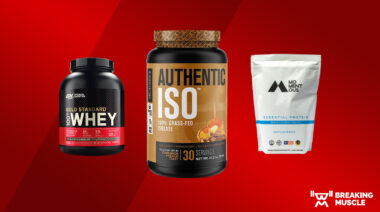Have you heard of the anabolic window? Supposedly, it’s a period of time after your training session when your body is particularly primed to accept food and shuttle it towards lean muscle mass. Bro-science traditionally estimates it lasts somewhere between thirty minutes and two hours after your workout. A recent study from the Journal of the International Society of Sports Nutrition examined this phenomenon. Researchers reviewed 23 previous studies on protein intake and timing. What they found may surprise you.
When it came to building lean muscle mass, protein timing wasn’t a factor. Across all the studies, groups that gorged on protein immediately after exercise fared little better than those who simply ate the same amount of protein throughout the day.
Now, total protein intake certainly mattered. It alone seemed to cause most of the differences in results. But this review indicates that if the anabolic window does exist for protein intake, it may persist as long as four to six hours after training. This is not what we were previously told. We were told that after we finish our last rep, we have precious little time to eat a whole salmon and enough Nutella to induce diabetes, or else we will shrivel and die from catabolism. I’m going to miss those days.
The average subject from all of the studies reviewed ate 1.66 grams of protein per kilogram of bodyweight per day. For a 200-lb man, this is about 150g of protein per day. That is in line with recommendations for strength training athletes from most current research. However, it’s decidedly short of the old bro-science recommendation of one gram per pound of body weight per day.
So are you ready to ditch your post-workout protein shake? I wouldn’t be so hasty. This review has several limitations. First, many of the studies reviewed dealt with inexperienced athletes. The needs of new athletes are far different from those of experienced trainees. It is possible that new athletes simply benefit from any increase in training and protein consumption, but experienced athletes may have to time protein consumption to maintain steady gains. Next, the studies only examined protein, not carbohydrates. My own experience tells me that carbohydrate intake and timing is also important for making gains in muscle mass. Were some participants among different studies eating 50g of carbs per day while others were crushing jelly donuts? We just don’t know.
The big conclusion I take from this study is that total protein intake is crucial to athletic performance. This means you can’t rely on a post-workout drink and the mythical anabolic window to deliver most of the protein you eat each day. Regular, moderate doses of protein are necessary to support a hard-training athlete looking to build lean muscle. The post-workout shake isn’t a magical solution that allows you to eat Saltine crackers and peanut butter cups the remaining 23 hours of the day. Post-workout nutrition is just a part of the solution, not the full solution.
References
1. Brad Schoenfeld, et al. “The effect of protein timing on muscle strength and hypertrophy: a meta-analysis.” Journal of the International Society of Sports Nutrition 2013. 10:53. doi:10.1186/1550-2783-10-53.
Photo courtesy of Shutterstock.






